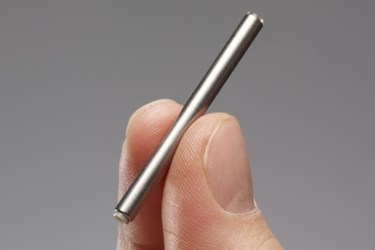Intarcia Raises $215 Million Toward Tiny, Implantable Diabetes Mini-Pump
By Jof Enriquez,
Follow me on Twitter @jofenriq

Intarcia Therapeutics has closed $215 million out of its target $600 million in venture capital funding it seeks by the end of the year for its subdermal mini-pump for type II diabetes patients.
Boston-based Intarcia develops the drug-device combination ITCA 650, a matchstick-sized, osmotic mini-pump implanted subdermally that delivers a steady release of the glucagon-like peptide-1 (GLP-1) receptor agonist exenatide for up to a full year. The implant is based on Intarcia's Medici drug delivery technology, which stabilizes exenatide at or above human body temperature. Once the device is implanted, extracellular fluid enters it at one end to drive a piston, which releases the drug at the distal end of the device at a steady rate.
ITCA 650 is touted as a potential game-changer in diabetes care.
"This device would alter the treatment algorithm for type 2 diabetes, becoming a viable third-line treatment option after lifestyle measures and oral medications. It would reduce the burden of monitoring and compliance on the patient, since it only needs replacement around once a year," notes Manya Aggarwal, a senior analyst at Decision Resources Group.
The $215M equity financing was led by Lucion Venture Capital Group and unnamed investors. Intarcia expects a larger second close with additional top-tier investors in the fourth quarter, bringing total funding up to $600 million to support approval and launch of the device next year, according to an SEC filing. That would bring Intarcia's total valuation at more than $4 billion, says the company.
Intarcia plans to apply for U.S. Food and Drug Administration (FDA) approval of the device within the next two months, with approval expected sometime in late 2017, company CEO Kurt Graves told the Boston Business Journal.
Intarcia in 2014 retained full control to market ITCA 650 in the U.S. after inking a $1 billion licensing deal with French pharmaceutical firm Servier, which holds exclusive rights to the device outside the U.S. and Japan.
"Ultimately, our goal is to open up a new pathway of delivering once or twice yearly medicines that fundamentally hold the potential to transform therapeutic and economic outcomes over time for millions of patients, and the healthcare system overall. At our core, our proprietary Medici Drug Delivery System does this by stabilizing and optimizing the potential of the medicines we develop, enabling the medicine to be delivered just once or twice yearly, and by addressing the massive behavioral challenge of non-adherence with pills and injections that currently impacts the majority of patients in every chronic disease we face," said Graves in a news release.
Besides diabetes care, the company plans to use the cash infusion for R&D efforts for other major chronic disorders, such as obesity and autoimmune disorders.
“We’re bringing a Renaissance in the delivery of medicine for chronic diseases,” Graves said in an interview with the Boston Globe, citing figures showing 60 to 80 percent of patients stop taking medications within six to 12 months. “We’re trying to open up a whole new platform for delivering these medicines by taking the problem of patient noncompliance off the table.”
